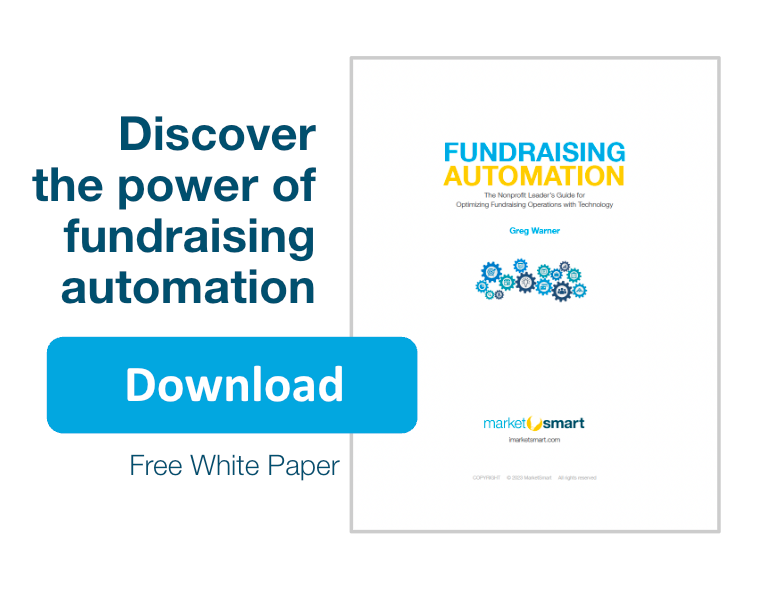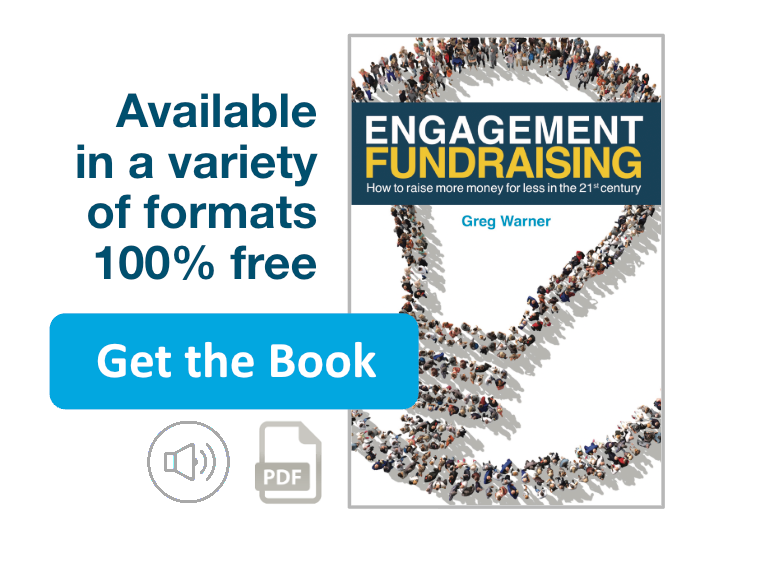Should you work on building and sustaining long-term donor relationships that lead to major giving, or should you prioritize winning low-dollar gifts as quickly as possible?
When it comes to major gifts, the question is a big one. For the most part, focusing on relationships will likely lead to slower initial growth but more big gifts down the road obtained with less effort. And trying to win near-term gifts could possibly lead to more money initially, but the future will be less certain.
Which is better?
The question itself is much more complex than it seems.
It would be better phrased, what’s better for whom? What’s better for donors? What’s better for your nonprofit’s staff? What’s better for the beneficiaries of your mission? Of these three groups, whose interests matter more, and whose interests are better served by which of the two approaches?
Well, we’re not going to keep you waiting. Here’s MarketSmart’s answer:
Long-Term Relationships Matter More than Near-Term Gifts
The primary reason can be found in that age-old saying about giving someone a fish versus teaching them how to fish.
Giving someone a fish is like winning lots of gifts immediately, but not focusing as much on donor relationships. Yes, you’ll have money today. But tomorrow, you’ll be back in the same situation, needing help again.
Teaching them to fish is like focusing on long-term relationships. You’ll have a more stable and reliable donor and fundraising base from which to grow your program and your mission.
In other words, focusing on relationships with donors benefits the donors, but it also benefits the beneficiaries of your mission – now and into the future. And as you’ll see, it also benefits your staff more. Strong relationships produce better results for all three groups of people – donors, staff, and beneficiaries.
Let’s dive in to this to see why.
Why Near-Term Gifts Are Less Desirable
There are four primary reasons why focusing on short-term gifts makes it harder on everyone touched by your organization.
1. Less Stability
Many might disagree. They’ll say that aiming for low-dollar, transactional gifts strengthen your foundation. But do they really?
Where’s the guarantee that low-dollar donors will continue giving? According to the Fundraising Report Card’s real-time benchmarks at the time of this writing, lifetime value for low dollar givers (under $100) is just $46 while major donors giving over $5,000 is almost $78,000.
As the fish analogy demonstrates. With more transactional, more fickle low-dollar donors and fewer long-term relationships, the organization does not have as much assurance that it can continue to provide the services and programs it is providing now, and will need to offer in the future.
The beneficiaries of your mission will feel that instability, and so will you. There will always be that chance if you can’t win some new big gifts, that you’ll have to close entirely, adjust programs, or lay off some staff.
It will be harder to continue funding the same programs year after year after year because revenue will fluctuate.
I’m not saying you should stop building your base of low-dollar donors entirely in the near term. Rather, I’m just pressing you to consider whether this approach is worth the cost now that you know that the lifetime value you can expect from these folks is so low. You’ll need quite a lot of them to truly secure your organization’s future.
2. Increased Stress and Uncertainty for Staff
Your staff will feel it too. They may experience this persistent, nagging feeling that if things go bad, they could lose their jobs. They’ll worry more about their friends, their income, their families, and all the things stable income makes possible. They will know how little money your organization has in its financial cushion. They will know how long you can operate if your biggest sources of funding dry up.
This kind of stress makes it harder to perform at work and to go all in on your mission. If I over-commit to this and it doesn’t pan out, what will happen to me? Those kinds of questions will always loom in the back of the minds of your staff. That’s why this stress and uncertainty leads to increased turnover.
However, when your staff knows they have trusting, supportive, enduring relationships with wealthy people who won’t let the mission suffer in times of great distress, they’ll feel secure and less stressed out.
3. Increased Need for Urgency to Motivate Gifts
With a focus on near-term gifts, your fundraising team has to use some of those time-tested but somewhat distasteful strategies for motivating donations. You know the ones I mean – the pushy, demanding, urgent, world-is-ending-if-you-don’t-give kinds of fundraising methods that, ironically, some people who prioritize winning near-term gifts profess to dislike.
When you rely on a nonstop flood of gifts due to a less stable financial position, you have to be much more aggressive in your efforts to win those major gifts through ambush asks and drive-by solicitations.
Donors tend to dislike this sort of fundraising. And some fundraisers dislike it too because of how it requires them to speak about and treat their beneficiaries.
4. Less Likely to Win Repeat Gifts
If you neglect the relationship, it comes as no surprise that fewer major donors will become repeat major donors. Some will, because they buy in to your mission and commit to it for their own reasons. But many others won’t, because it will be clear to them that you value their money more than them. And for many, that just doesn’t feel very good.
Also, they won’t have a very good understanding of how their gift made a difference, because you didn’t tell them, since this is part of what it means to sustain a relationship with a donor.
If you don’t sincerely thank donors as often, don’t update them on the impact of their gift, don’t engage them to get involved in other ways, don’t ask for their opinions or perspective, and don’t try to help the donor advance their own personal hero story as charitable giving researcher Dr. Russell James strongly advocates – then there’s no reason to expect you will win nearly as many repeat gifts. And if you do, they will be smaller than they could have been.
Why Long-Term Donor Relationships Matter More
A recent national study found that more nonprofit leaders and staff believe prioritizing the donor relationship is more important than winning a near-term gift. This was true whether speaking about low-dollar donors, mid-level donors, or major donors.
But, there are sizable numbers of people in these positions who feel the other way, or who aren’t as sure.
So, here are six reasons why your organization will do much better if it builds its fundraising strategy about stronger relationships with donors.
1. More Repeat Gifts
All the reasons why you’ll win fewer repeat gifts by focusing on near-term gifts explain why you’ll win more of them when you focus on the relationship with the donor.
Donors will feel more valued, understood, respected, known, and listened to. They will feel more like partners than pocketbooks. Their interests will matter, and they’ll get to fulfill their own dreams while making a much bigger impact for the beneficiaries of your mission. And they’ll do this repeatedly, for the rest of their lives and beyond in some cases.
For proof, just look at the Fundraising Report Card’s benchmarks and you’ll see that $5,000+ donors resulting mostly from long-term relationships retain at more than double the rate of the low-dollar donors.
2. More Stability and Certainty – for Everyone
Long-term donor relationships lead to more financial stability for the organization. That means your staff will feel more secure in their jobs, less prone to look elsewhere, and more willing to buy in to your mission and their part in it.
A more stable staff means your beneficiaries have their lives touched in greater ways. Spending less money on constant hiring, training, and the other costs of turnover leaves more for the whole reason your organization exists – the people you’re helping! Plus, since you’ll have more money year after year, there will be more ways to help more people. And finally, your staff will keep their institutional knowledge where it does the most good — within your organization.
3. More Likelihood of Winning Gifts of Assets
For the vast majority of wealthy people – however you define ‘wealthy’ – they have much more of their wealth in assets rather than in cash.
Assets refer to things like retirement accounts, stock options, property, businesses, art and collectibles, and other investment options that are harder to extract money from. Cash refers to basic bank accounts like checking and savings.
When you prioritize the donor relationship, you have time to get a richer understanding of each major donor’s financial situation. You also have time to build trust. So when it comes time to ask that donor for a major gift, they will be more willing to have a conversation about how to give from their much larger asset pool, as opposed to just their cash pool.
Picture a donor who has $1 million in basic bank accounts, but $10 million in various other types of assets.
If they give just from their cash, they’re drawing from only the $1 million. From there, $100,000 feels to them like a lot of money. It’s 10% of my account!
But if they’re drawing from the $10 million, $100,000 feels like a very small amount – only 1%.
You want gifts of assets. And you win those much more often when you nurture the relationship with the donor.
4. More Positive Word of Mouth
When donors love an organization, they talk about it. They tell their friends, coworkers, family, and anyone else in their network. And if these donors are wealthy, there are probably wealthy people in their networks too.
Word of mouth – reviews, testimonials, and all the other forms of it – is and always will be more persuasive than direct appeals.
When a donor has a very rewarding relationship with your organization, they will talk you up, and that can only be good for you.
5. Greater Chance of Planned Gifts
How do you win more planned gifts? By building and sustaining lifelong relationships with donors. It’s that simple. A person doesn’t put an organization in their will if they have no personal connection to it at all.
To get more estate plan gifts for your organization, you want to become part of the lives of your major donors. Then, when you propose this option, many of them will be happy to give part of their estates to you.
This is the most distant and extreme benefit of focusing on the relationship. You might not get this money for twenty years. Maybe forty years, depending on the age of the donor. By that time, no one benefitting right now from your fundraising efforts will still be around – not employees, not leaders, and not most beneficiaries.
That’s why the focus on donor relationships requires you to think beyond yourself and how it benefits you. You’re thinking instead about people who aren’t even born yet in some cases, but who will need your organization to be there someday.
Your mission matters, even to people years away from needing its help. Strong donor relationships ensure a continuing mission, well after you’ve moved on to something else.
6. Greater Chance of Heirs Continuing the Relationship
Well, I guess there’s one even more extreme and distant benefit of focusing on donor relationships. Even after you get the money from a planned gift, if you’ve done well building a strong relationship with a major donor, there’s a good chance their heirs might be open to continuing that relationship.
That could mean decades more of partnership and major gifts. Again, this is long-term thinking. But as they say, Rome wasn’t built in a day.
Neither are well-functioning nonprofits.
What Matters Most? Your Mission and Its Beneficiaries
This is bigger than you. And it’s bigger than your donors. This is about the people (or animals) your organization helps, and the ultimate goals of your mission.
Unless your mission is such that you hope to one day actually accomplish it and close your organization in victory – which it might be – you want long-term, stable sources of funding so your mission can continue helping and making the world a better place.
That means focusing on donor relationships.
How to Build Stronger Donor Relationships
MarketSmart’s software – our Engagement Fundraising automation platform, was designed to make it possible for nonprofits to build stronger relationships with many more donors than humans by themselves could manage.
How? Because relationships require ongoing communication, and that’s hard to do well for the numerous donors you’re working with.
With AI automation, you can be relieved of some of the burden of sustaining ongoing communication with your major donors and prospects.
See how MarketSmart helps gift officers perform better
Related Resources:
- Don’t Just “Find” Donors; Build Relationships for Lasting Impact
- 4 Primal Motives for Major Gifts – the REAL Reasons People Make Transformational Gifts
- Revolutionize Fundraising: Let’s Stop Making it Uncomfortable
- The 3 Key Elements of a Good Fundraising Story




